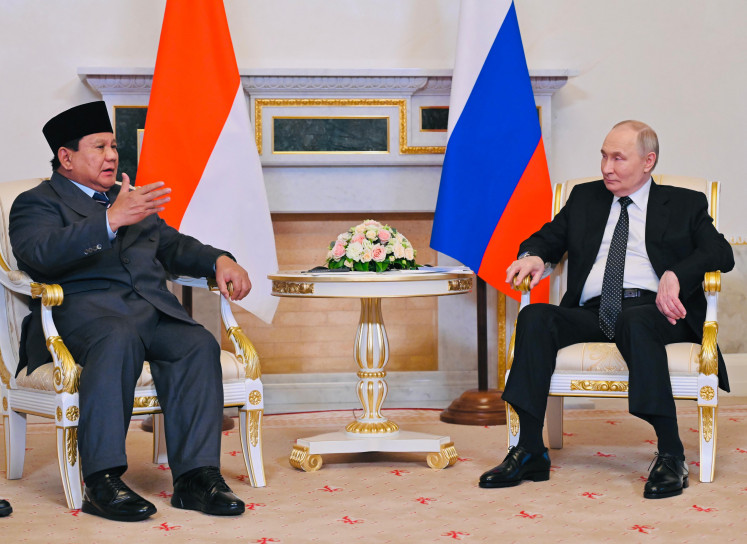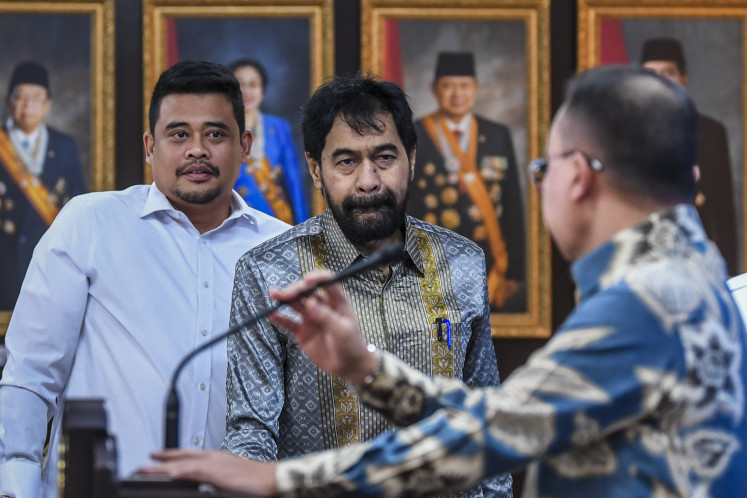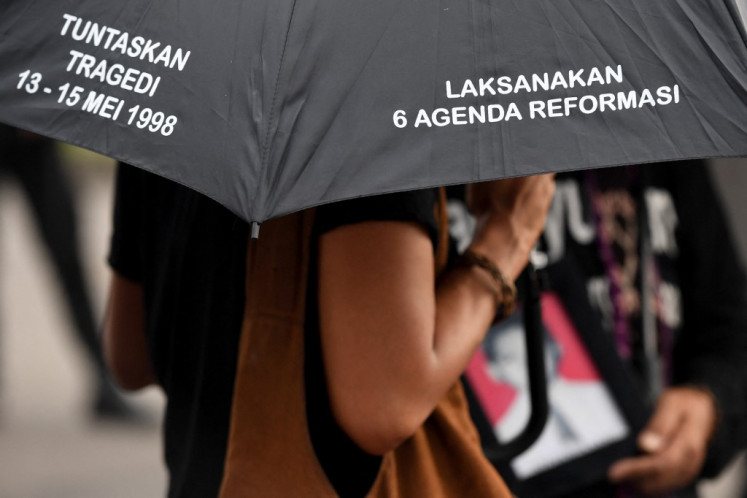Popular Reads
Top Results
Can't find what you're looking for?
View all search resultsPopular Reads
Top Results
Can't find what you're looking for?
View all search resultsBy the way…BJ Habibie in my memory
My earliest memory of Bacharuddin Jusuf Habibie, Indonesia’s third president who passed away at the age 83 years on Sept
Change text size
Gift Premium Articles
to Anyone

M
y earliest memory of Bacharuddin Jusuf Habibie, Indonesia’s third president who passed away at the age 83 years on Sept. 11, was in 1950 at his hometown of Makassar, South Sulawesi.
At that time, I had switched from a local high school to Concordante HBS, where Dutch teachers were supposed to offer the best education. In the class was BJ Habibie, then known as Rudi Habibie, and his sister Alwinny “Wenny” Khalsum.
I remember Rudi as a skinny boy looking into the world with large sparkling eyes popping out from a fairly small face, and ready to take in or challenge the lessons taught.
But before long, the school became redundant, with the Dutch teachers choosing to leave the city because of the political upheavals caused by the rebellious Andi Abdul Azis who instead of following the Jakarta government, chose to side with the Republic of the United States of Indonesia (RIS).
I had no contact with Rudi since then, except for during a brief encounter in Germany.
My best memory of Rudi Habibie however, goes back to 1998.
I had joined the 22 women led by Saparinah Sadli — a trailblazer in gender issues and human rights — who asked to meet with the then-president over the government’s persistent denial of the widespread rapes that occurred during the anti-Chinese riots in Jakarta in mid-May 1998.
In spite of the shock they had evoked among the entire people, the government remained unmoved, even after 16 women of interdisciplinary academic and professional backgrounds made a statement asking the government, among others, to denounce the rapes, apologize and take measures to prevent them from happening again.
The statement went viral through the internet and what was known as the Civil Society on Violence Against Women found support from some 4,000 people.
But ministers steadfastly denied atrocities had happened, so we deemed it high time to provide the president with a women’s perspective.
A request to meet the president was written and delivered to his residence.
Upon which Ibu Sap, as Saparinah is known among friends, received a call that she was expected at Bina Graha at 2 p.m. that same day.
She was warned, however, that the president would only meet with her, upon which she insisted “all the 22 women or none at all”. His staff, however, kept saying only Ibu Sap could come.
On that fateful day on July 15, Kuraisin Sumhadi, vice chair of the Indonesian Women Congress (Kowani) and one of the 22 women, came along, arriving at Bina Graha quite early.
The guard said the president was not there yet and reiterated he would only meet with Ibu Saparinah Sadli.
Undaunted, Kuraisin answered: “We will wait here till all of us are allowed to come in, even if we have to sleep here”.
At long last, everyone was allowed to come in, and the president was quite reserved. He started telling us he had been in office for only 53 days, etc. etc.
But after listening to reports from the Team of Volunteers and Mitra Perempuan Crisis Center, he suddenly woke up. “That is exactly what my own niece, a medical doctor, told me, and she would not lie to me!” he said.
The atmosphere changed completely. Then and there, the president asked us to jointly draft a statement that he would follow up. And while we tried together to formulate the draft, the president hilariously could not say the word mengutuk (denounce), and instead repeatedly said mengetok (knock), and realizing this, he laughed together with us at this funny inability.
When his staff cautiously suggested the president should bring this to the Cabinet before issuing a statement, Habibie stood tall, proving he was in charge. Defiantly, he replied: “May I have an opinion of my own? These are respected women of society and I believe them. Just for once I want to do what I want to do”.
The president then invited us to use his computer to type the statement, and when it was printed on paper without a letterhead, he insisted it be typed on official paper with the presidential letterhead.
And so it came that, on that very day after more than two hours with us, the president’s denunciatory message to the nation was broadcast on radio and TV before journalists who were already waiting.
One week after this meeting, the president responded to the women’s demand for the founding of a National Commission on Violence Against Women. In the presence of virtually a complete Cabinet at Bina Graha, the president asked Ibu Saparinah to form the commission, and asking sociologist Mely G. Tan and political scholar Smita Notosusanto to assist. And this they did.








